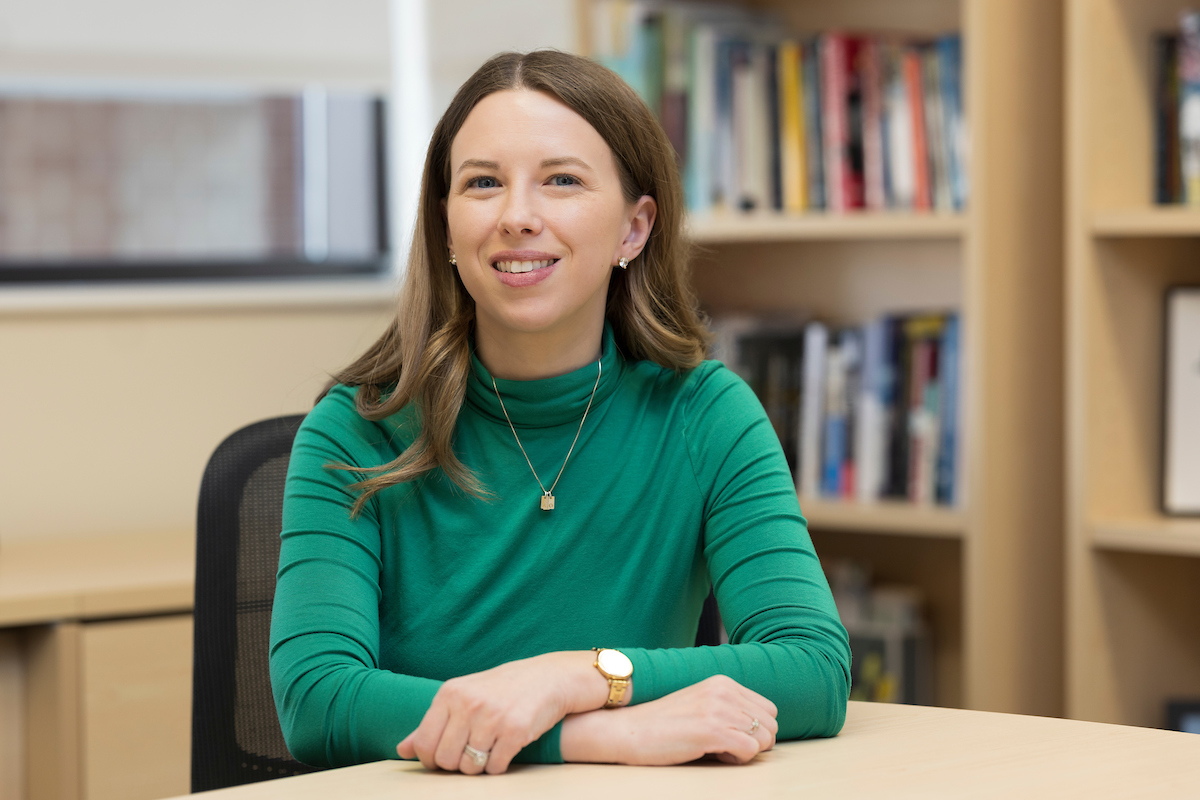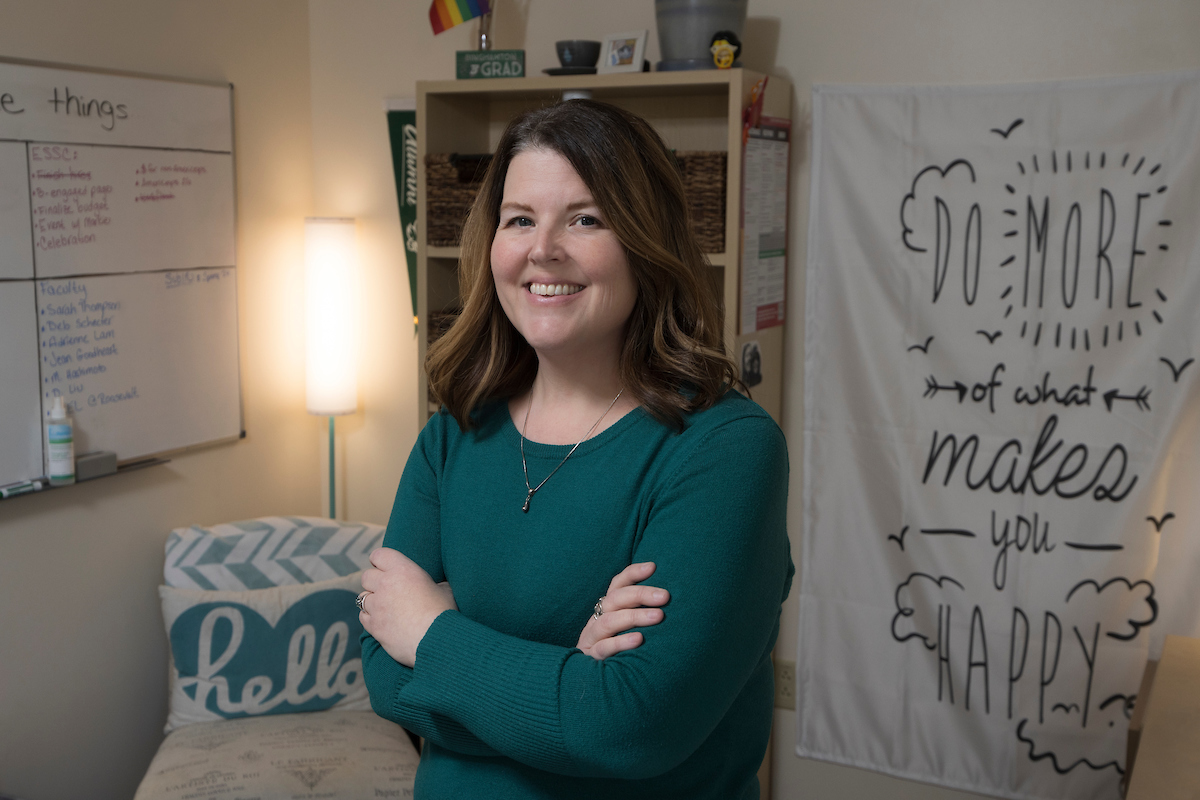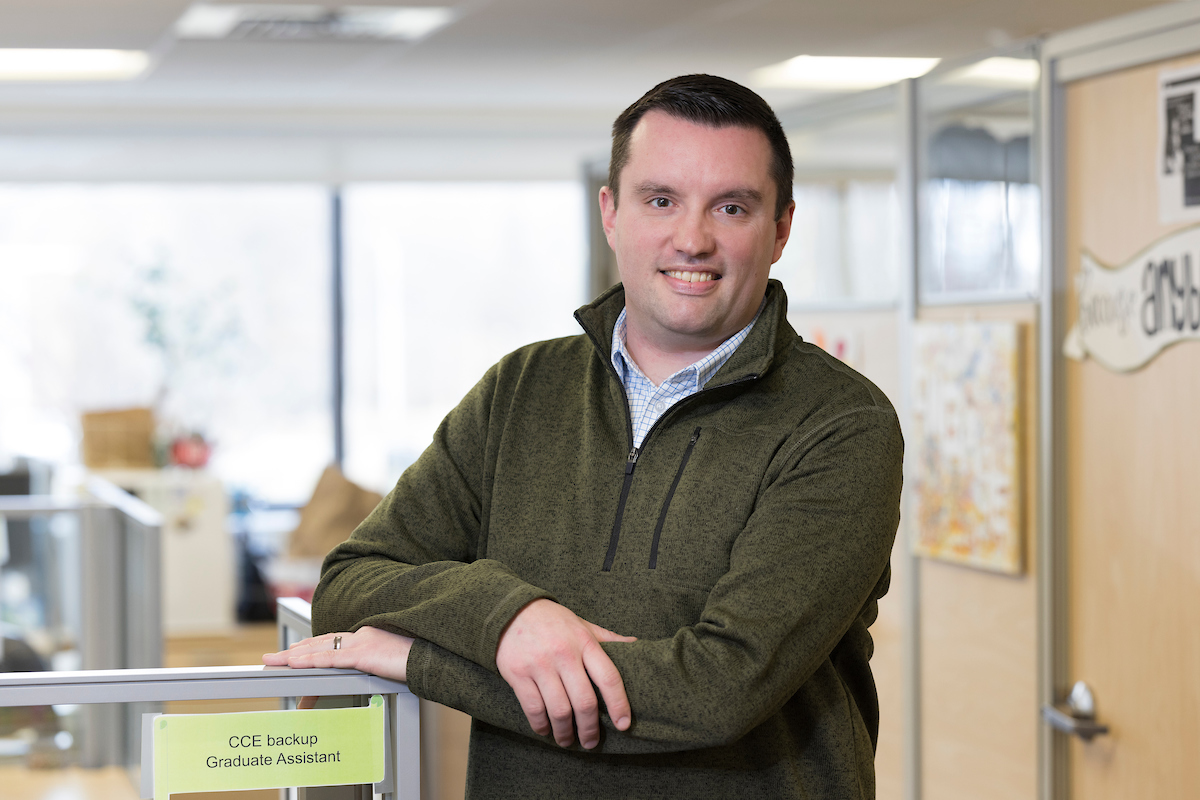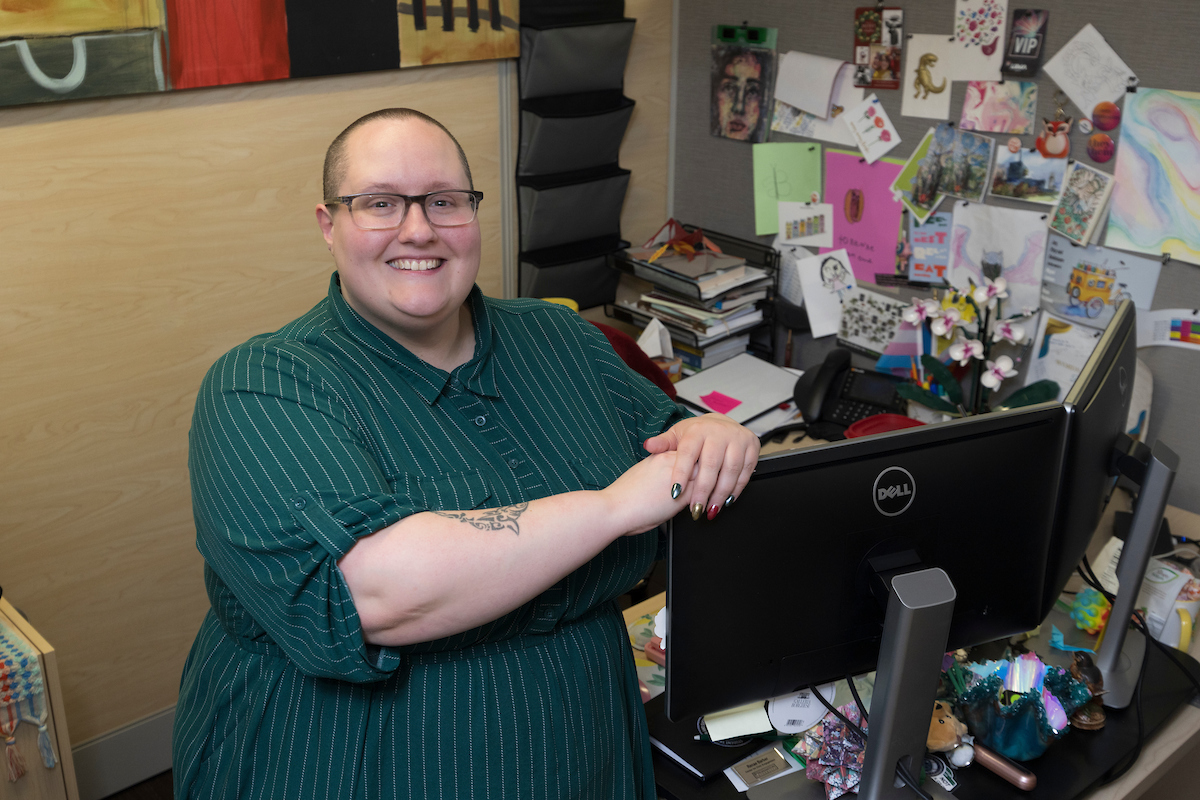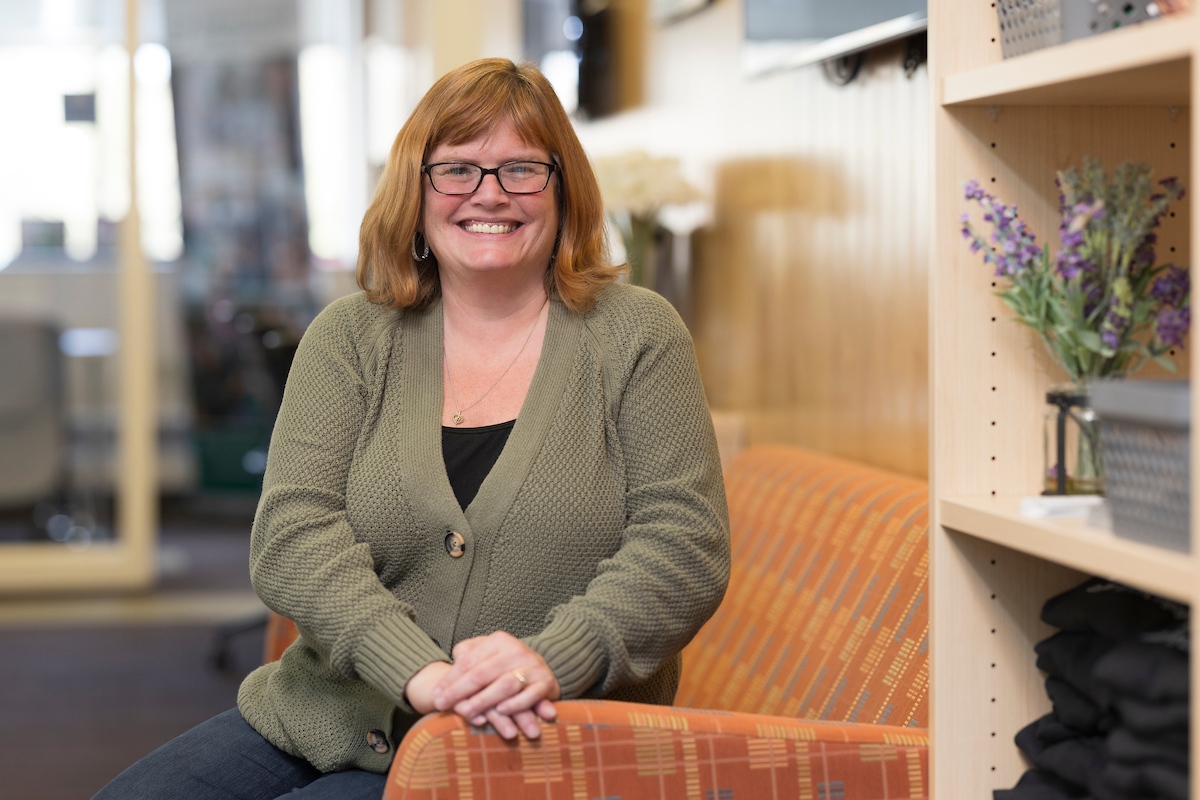Meet five alumni working in the Center for Civic Engagement
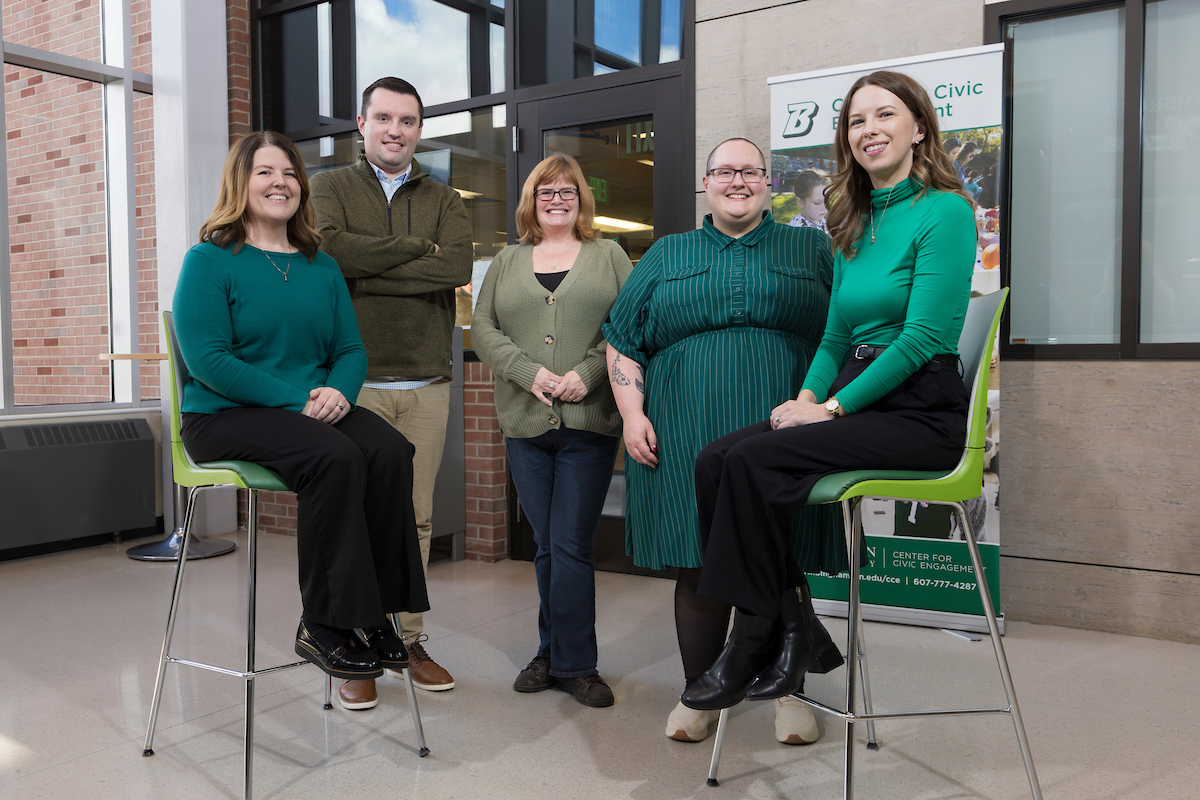
Nestled in the corner of The Union is the Center for Civic Engagement (CCE), a branch of Binghamton University’s Student Affairs Division, whose mission is to cultivate partnerships that strengthen communities and develop active and engaged citizens. This mission is achieved through connecting current students with volunteer and service opportunities, along with developing civic engagement programming that allows students, faculty and staff opportunities to make their voices heard and take action on important issues.
The CCE is currently made up of nine professional staff members, five of whom are Binghamton alumni who hold one, two and even three degrees from the University. Although from different backgrounds, the staff hold a shared belief in the CCE’s mission. We spoke to each of them to find out what led them to their roles at Binghamton today.
Alison Handy Twang ’11, MPA ’13, PhD ’22
Director
Question: You hold a bachelor’s degree in political science; what moved you towards a Master’s in Public Administration (MPA) as the next step in your academic journey?
Answer: I really enjoyed all my political science classes at Binghamton, and I was a history minor as well. I was a teaching assistant for Professor of Political Science David Cingranelli my senior year, and that experience got me thinking more about pursuing my master’s and different career paths. Someone from Binghamton’s MPA program visited one of my political science classes senior year and spoke to us about the program. I had never heard of an MPA and it just seemed like such a good fit, aligning with what I was interested in.
Q: Share a little bit about what came next after earning your MPA.
A: I graduated from the MPA program in 2013. During the second year of my MPA I had a graduate assistantship right here in the CCE, so that’s what led me to learn about career paths in higher ed and finding an office that combined both my interests in doing work within the community and with college students. I went on to work for two different non-profits, and then in 2015, I joined CCE part-time as a research and development specialist. The following spring I was hired officially as the assistant director. It was when I started at CCE that I started thinking more about earning my PhD because our field of community engagement crosses over into academia. We work a lot with faculty around integrating community engagement into their courses and into their research.
Q: As the CCE Director, what value do you think it brings having several alumni working in this office?
A: Our team is incredible! I think having knowledge about the institution is helpful in relating to students and being able to understand the experiences that they are having at Binghamton. It makes it easier for us to guide and support them, and the same goes for the work we do with our community partners. Having several staff with years of experience, connections and relationships across the institution makes it easier for us to be that bridge-builder for our students, our faculty and our community partners.
Q: After all of these years, what keeps you at Binghamton?
A: I’ve felt so fortunate to receive the support I have regarding my career. I’ve been here for about 10 years in a professional role and have been able to advance in my career with the support of really great mentors — that’s not something that people experience in every workplace. I’ve been grateful for the opportunities and for all the people who have put trust in me over the years.
Sara Hall ’01 MSW ’06
Senior Assistant Director
Q: After earning your bachelor’s in human development from Binghamton, did you enroll in the Master of Social Work (MSW) program right away?
A: I finished my coursework as an undergraduate a semester early, so I started working at Catholic Charities of Broome County full-time and then enrolled in SUNY Albany’s MSW program part time that fall, while Binghamton’s MSW program was still launching. When Binghamton launched their part-time MSW program, I transferred and was in the first part-time graduating cohort.
Q: Your full-time career didn’t start at Binghamton, so can you share a little of your professional background and how you found yourself in this role today?
A: After graduation, I worked for the non-profit ACHIEVE right here in Broome County, for about eight years. I then worked briefly at the Crime Victims Assistance Center in their clinical department. While working there, a former social work professor of mine, Brian Flynn, reached out and said that Binghamton University was launching a new initiative called “Community Schools” and they were looking for people to be community school coordinators. The initiative seemed like a great marriage of all that I had previously done academically and professionally and really felt like a way for me to make connections with our campus community to our local Binghamton community. I did meaningful work with families and children in the Johnson City school district through that position for about four years. In 2018, I came to the CCE in a newly created position to help manage those community school connections with the University.
Q: What advice do you give the students you work with through CCE?
A: I supervise a lot of social work students, and something I always tell them is that these classmates of yours are going to be your network. I’ve stayed connected with several people from my cohort, both undergraduate and graduate. Binghamton gave me that connection, where I’m comfortable calling them if I have a question about the area that they are now working in. The CCE does really great work with students and helps make those connections, either to non-profits in the community or local school districts. One of the things we really emphasize for our students is mutual exchange. While they’re giving their time, energy and passion to the school — and that’s having a huge impact on our community partner — they’re also gaining a lot from that experience that they’ll carry into their future careers.
Jeremy Pelletier, MPA ’12
Assistant Director of Campus Engagement
Q: What was your first position at the University when you started working here 10 years ago? What brought you to the CCE?
A: After graduating with my MPA, I was hired as the Broome County deputy clerk, and then became the City of Binghamton clerk. I loved my time as a student at Binghamton; the professors were great, I learned a lot and I knew that I would enjoy working here. My MPA courses and work experience exposed me to a lot of budgeting and finances, so when I came across a position at the University’s Services for Students with Disabilities Office that was seeking those skills, I applied. I was the assistant director there for over eight years before joining the CCE.
Q: What’s the best part of your job?
A: Working with our student body. We do a lot of tabling and talking to students about what we do. My role here is a blend of what I’m passionate about: community and civic engagement. I love making sure students know how important it is to vote, and that voting matters. I like to focus on local races, and with the victory margins being so close, I tell students that you can have a really large impact on who you want to represent you. Another favorite part is coordinating Days of Service projects. The goal of these projects is to spark students’ interest in getting more involved in the local community.
Q: How would you describe your experience as a Binghamton employee?
A: It’s been great, and I don’t plan on ever leaving! I’m a part of a really supportive team and a great community. I bring my kids here to campus to play and have brought them to the Days of Service projects to help students volunteer. Being a parent and working full time comes with challenges, but having a team at work who understands and supports that makes such a difference.
Renae Barber ’17, MS ’20
Community Engagement Outreach and Assessment Specialist
Q: You were a transfer student at Binghamton. What was that experience like?
A.) Binghamton challenges students academically in the best way possible. When I began classes here, I instantly felt pushed to be my best. The faculty really crafted their classes to get you where you had that higher sense of achievement. I think we attract very competitive, very driven people — that includes faculty, staff and students — and it comes out in that community-learning type space. As someone who now works here, I’m motivated to constantly be doing something to challenge myself and grow, and have the support to do so.
Q: The CCE has been heavily involved in the University’s application for the Carnegie Classification for Community Engagement these past few years. As the community engagement outreach and assessment specialist, what is your primary role in this?
A: A major bucket of my work has been the prep for this classification, which recognizes institutions that have made community engagement a priority. The application itself is over 100 pages long. My work has been creating the system to keep us organized and on track. A lot of what I do are these homegrown internal systems that don’t need to breach the level of complexity of IT building a new software tool, but also need to be more sophisticated than just a formatted Excel sheet.
Q: Are there any professional development opportunities that you’ve taken advantage of recently or are looking forward to?
A: I recently applied to be a reviewer for Carnegie. They do a peer review process and obviously, I wouldn’t review our own application, but that is a professional development opportunity that I’m really excited about. Alison Handy Twang (the director of the CCE) and the team have fully supported this endeavor. I’ve gone to conferences and participated on panels to share about our experience as a University preparing for Carnegie.
Tammy Lindow ’05
Assistant to the Director
Q: How would you describe the changes that you’ve seen at Binghamton since you were a student here more than 20 years ago?
A: It’s been exciting! The campus looks nothing like when I came here; different, but in a good way. Every time I see more construction going on, I think, “They just keep making it bigger and better!” When I was a student, departments weren’t as centralized, and it was a challenge to get information on resources offered or know where to even look for it. I was a transfer student, and we didn’t have the Transfer Student Success office and resources back then that are available today, or even the career service offerings — I think it’s wonderful that we’ve expanded information sharing and furthering the support of our students’ needs.
Q: What would you say sets Binghamton apart from other schools?
A: There’s a lot of pride here, and our university is thinking more and more about community engagement than it ever has before, which I love to see. Binghamton has had strong leadership for many years that has grown this campus not only in size but in research and caliber of students.
Q: You hold an important role in the processing and distribution of grants between the CCE office, faculty and the community. Can you talk a little about that?
A: I’m always impressed by the faculty that come to work at Binghamton; they’re doing some amazing research. Whenever I’m processing a community engagement and community partner grant, I’m just blown away reading the scope of work that’s being done or proposed. I’m so proud to say that I’m a Binghamton alumna!

